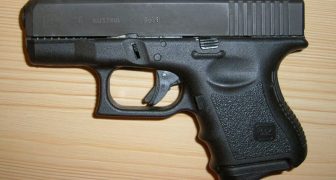This is a guest post by Andrew Betts
What gun is best for home defense? You may as well ask “What car is the “best” for driving kids to soccer practice?” or “What computer is best for watching squirrels water skiing?” It’s a very broad question that has been covered approximately as many times as the question of whether Kirk or Picard was the better captain (Kirk), but I intend to put a little finer point on it, to look at it from a different perspective than you may have seen before, and perhaps remove some misconceptions you might hold.
In practical terms, the “best” weapon is the one you have when you need it. The best weapon to have at hand is the one with which you are most proficient. You should invest your time and training budget on learning to become most proficient with the tool that is most technically suited to the job. If you believe that you don’t need professional training, then you REALLY need professional training, but that’s another article. So what weapon is best suited for the job?
Handguns
The handgun is compact and convenient to carry on the person so by default it might just be the gun you happen to have at hand when you need one. If it is legal to carry a handgun in your state, you should strongly consider getting some training and a permit if your state requires it. That said, it is legal to carry a gun in one’s own home almost everywhere. Why should you carry a holstered pistol in your own house, though? If you expect your home invaders to give you a courtesy call fifteen minutes prior to arriving, then I suppose you don’t need to. If you live in an impenetrable and secret bat cave, then you probably don’t need to. If you live in a house, like the rest of us, it is possible for ne’er do wells to catch you unawares.The best way to defend yourself from a surprise attack is to have a gun within reach. Unless you want to sling a rifle or shotgun around the house, a holstered handgun is the most practical way to do that. “But that makes me feel unsafe,” you say. Well, maybe it just reminds you that the illusion of safety you felt before was just that: an illusion.
Are handguns really ideal for defense, though? If a psycho is beating your door in and you have a few moments to arm yourself, would you choose a handgun? You shouldn’t! Not if you can choose a shotgun or a rifle. To begin with, pistols aren’t powerful; they’re portable. They do substantially less tissue damage than rifles or shotguns. Now this is the part where Jimbo pipes up and says “Yeah, well, I don’t suppose you’d like to stand over thar and let me take a shot achoo with my ol’ fotuh fahv.” No, I would not like to get shot at with your pistol. Of course, I’m also not inclined to stand in front of you while you spit watermelon seeds at me but that doesn’t make watermelon seeds a good choice for home defense, either. What’s more, your friendly neighborhood crackhead isn’t likely to oblige you by “standing over there.” He will be moving quickly, attempting to use cover, and may be shooting back at you.
And this is a great point to mention the fact that pistols are also harder to shoot quickly and accurately because of both their short sight radius and the lack of a stock. Then there is the fact that pistols are harder to retain in a hands on fight than a slung rifle or shotgun. If you find yourself checking doors in the middle of the night, you probably won’t take time to put on a belt and holster. You might have time to tuck your head in a sling, which will come in handy if you need to use both hands for anything.
Typical handgun tissue damage
Shotguns
Now for years, shotguns have been the old standby for home defense and not without good reason. Shotguns are more powerful and easier to make hits with than handguns. They are relatively affordable. They are extremely versatile, and nothing beats the raw tissue damage they can produce. As Clint Smith puts it, “At close range, it will remove meat and bone.” Despite what good ol’ Joe  “Chuckles” Biden would tell us, shotguns are not so easy to operate and have a few other significant weaknesses.
“Chuckles” Biden would tell us, shotguns are not so easy to operate and have a few other significant weaknesses.
Remember when he told us how shotguns are easier to use? Well, unless you’re talking about a double barrel (read only two rounds and then five minutes to reload), the manual of arms of a pump or auto shotgun is fairly complicated. A Remington 870 or Mossberg 500 series is more difficult and complicated to operate than an AR, for example. Shotguns also have very limited capacity and tube fed shotguns take a long time to reload. Worse yet, the pump action is unreliable under stress. I’ve seen many experienced, tough, macho men short stroke their pump shotgun in competition and induce a stoppage that took several seconds to reduce. Had someone been shooting back, they would have acquired a few speed holes. The pump is even harder for people with short arms to operate. The heavy recoil slows split times no matter how tough you are and can be pretty rough on small framed people. If it’s not fun to shoot, you won’t train enough to be proficient.
Typical shotgun tissue damage:
Rifles
Okay, a bolt action .30-06 with a 3-9x40mm scope may not be a very good choice, but that’s not really what we’re talking about. A light, handy carbine chambered in an intermediate cartridge (5.56x45mm, 5.45x39mm, 6.8mm SPC, etc.) is an excellent choice. It’s fast handling and easy to hit with. It fires powerful, effective ammunition with less risk of over penetration than handguns or shotguns loaded with proper defense ammunition. A rifle can penetrate soft armor, if required (don’t laugh, some home invaders have begun wearing body armor lately). It is more precise than the shotgun and the lower recoil allows you to engage several targets more quickly. The standard capacity 30 round magazines mean that you are less likely to need a reload, which is a good thing because I don’t normally wear magazine pouches to bed. The adjustable stock and low recoil are also particularly friendly to small shooters.There are a substantial number of misconceptions about rifles and especially AR type .223 rifles, though. Even in today’s enlightened period of nearly universal internet access, there seem to be a surprising number of folks that believe that .223 is “too powerful” for home defense. What they really mean is that they hold the mistaken belief that it offers too great of an overpenetration risk. That’s absolutely incorrect.
In fact, .223/5.56mm actually is less penetrative of common building materials than service caliber pistols or a shotgun firing any shot size that is actually suitable for defense. Likewise, .223/5.56mm won’t “blow a hole through the bad guy and kill yer neighbor,” as you can see in the video below. Despite the fact that the “bad guy” block is placed only a few inches from the “wall,” which doesn’t allow time for the fragments to separate from each other, they penetrate the second block only about as far as the .177 BB that is used to calibrate the gelatin.
While many carbines are useful for defense, few share the outstanding ergonomics of the AR family. It is little wonder that it enjoys the popularity it does today. With the massive
 popularity of the rifle comes an economy of scale that makes it more affordable than most other similar firearms. There are certainly many viable choices, but there is little reason not to choose an AR for defense. It is what I use for defense and I believe it to be the “best” home defense gun, all other factors being equal.
popularity of the rifle comes an economy of scale that makes it more affordable than most other similar firearms. There are certainly many viable choices, but there is little reason not to choose an AR for defense. It is what I use for defense and I believe it to be the “best” home defense gun, all other factors being equal.
 Andrew Betts is no expert but he is an enthusiastic layman. He has never been a Space Shuttle Door gunner. He has been involved in the shooting sports since childhood and qualified expert on the M16, M4, M9, M240B, and M67 (no kidding, who didn’t?). He also stayed at a Holiday Inn Express once.
Andrew Betts is no expert but he is an enthusiastic layman. He has never been a Space Shuttle Door gunner. He has been involved in the shooting sports since childhood and qualified expert on the M16, M4, M9, M240B, and M67 (no kidding, who didn’t?). He also stayed at a Holiday Inn Express once.
Tell us in the comments what you think is the best gun for home defense.
Photo Credit – Chayak


Speak Your Mind